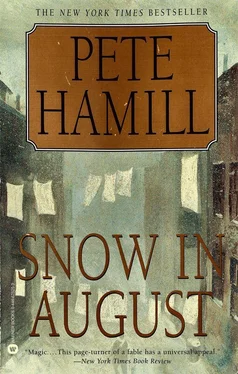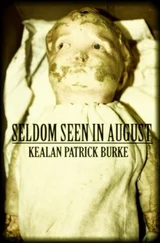Then, at last, it was time to go home. His mother arrived around nine o’clock with warm clothes and some old trousers with the leg slit so he could push the cast through it. She led him out through the lobby, carrying his newspaper clippings and comic books in a shopping bag, and they took the Ellison Avenue trolley car home. Boarding the trolley, he felt awkward with the crutch, clumsy and defenseless, as he passed it up to his mother and then took her hand to pull himself up two steps. Actions that once were easy were now difficult; he wondered how many times he’d jumped up those stairs without thinking about them for a second. The driver nodded as they boarded, then paused as Michael and Kate moved to the rear and started the trolley after they took seats in the row facing the back door. There were only a few people in the trolley. Michael stared out the window, afraid of seeing Tippy Hudnut and Skids, Ferret or the Russian. He didn’t want to see them, and he didn’t want them to see him. He just wanted to go to his room. And close the door. And get in bed. And read about the Dodgers. His mother glanced at him.
“You’re thinking about these thugs, aren’t you?” she said.
“No. Yeah. Sort of.”
“Don’t.”
“Why shouldn’t I?”
“They’ve been arrested.”
He glanced around, afraid someone might hear them, even in the almost empty car.
“You didn’t give up their names, did you?” he whispered.
“There were plenty of witnesses,” she said. “It was a warm night, people were out. Lots of people—”
“Mom, they’ll come after you . They’ll give you the mark of the squealer. They’ll—”
“Stop it, Michael!”
He felt as if he would fall. He’d made her cross, with his fear and his childishness. But she held his hand as the trolley approached their stop, and he took a deep breath and felt safer. Then she was pulling the cord, and standing, and taking his elbow, helping him to the door. The trolley stopped. The door opened. She went out first and then helped him down the steps. The trolley pulled away, steel wheels squealing on steel tracks, and she gave him the crutches. Then she looked warily around the avenue; so did Michael. There were familiar faces doing the usual things. Teddy polishing apples outside the fruit store. Mrs. Slowacki arranging newspapers on the stand. Peggy McGinty wheeling a baby carriage in a distracted way. But he saw none of the Falcons.
“The police have warned the whole rotten bunch,” she said, leading Michael into the hallway at 378 Ellison Avenue. “If they lay another hand on you, they’ll go away for a long, long time.”
“Yeah, and what about you? What if they get bailed out? What if they wait for you outside the Grandview? They—”
“Och, Michael: they’re a pack of stupid cowards,” she said. “But they are not that stupid. They must know now that they’ve gone too bloody far.”
He was very quiet as she unlocked the door to the apartment. They went inside, and the kitchen looked exactly as it did before he went to the hospital. He gazed at his mother as she started a kettle for tea. He wanted to believe her, to be as brave as she was, but he was afraid of the Falcons, afraid for himself, afraid for her.
“Don’t let them scare you, son,” she said, looking at his drained face and touching his hand. “That’s how they win.”
He trembled in the warm, bright morning light.
With her son home at last, Kate Devlin took the night off from the Grandview, switching a shift with another cashier. She made a stew, thick with potatoes, carrots, and onions, and beef that fell to shreds with a touch of a fork. Michael ate two helpings. They did the dishes together and listened to the radio and talked about things that did not matter. The windows were wide open to the warm night, and from the dark yards they could hear dishes clattering, laughter, radios, the sounds of the Brooklyn evening. Kate suggested tea and her son said he would love some tea, and then there were two sharp knocks on the locked kitchen door.
Kate was suddenly alert. She switched off the radio, as if to hear better, then took a carving knife from the drawer beside the sink. Michael lifted a chair and shifted his weight to his good leg in order to swing it better. There were two more knocks.
“Who is it?” she said.
“Me. A friend of Michael.”
When he heard the voice, Michael laughed and put down the chair and snapped the lock. He jerked open the door.
“Rabbi Hirsch!” he squealed.
The rabbi stood there in his black suit and black hat, his bearded face nervous and concerned. He had flowers in one hand, a small box from the bakery in the other.
“Hello to all,” he said, and bowed deeply to Kate from the doorway. She sighed and laid the knife down on the sink.
“Mom, this is Rabbi Hirsch,” Michael said. “Rabbi, this is my mother.”
“Nice to meet you, Mrs. Devlin.”
“Come in, come in, Rabbi,” she said, offering a hand. He bowed stiffly again and handed her the flowers and the package from the bakery. She took the package by its thin white string.
“Thank you, thank you,” he said, stepping into the apartment. Michael locked the door behind him, but the rabbi stood there awkwardly. His eyes took in the kitchen, but he avoided looking at Michael’s bruised face.
“Have a seat, Rabbi,” she said. “We were just having tea, and I know you like tea. Michael told me so.”
“Thank you,” he said again, taking one of the chairs. Michael sat facing him.
“Pound cake!” Kate said. “My favorite!”
Her voice is a little high, Michael thought; she’s actually nervous. She started a fresh kettle, ran water into a cheap vase, stacked the flowers in the vase, placed it on the table, and then found a plate for the cake, a knife, a cup and saucer for the rabbi. All in a nervous rush. Very few men came to this flat, and absolutely no rabbis.
“It’ll be just a minute,” she said.
“Forgive me, I don’t mean to have you troubled,” he said. The fragrance of the small purple flowers filled the kitchen, giving Michael a reminder of summer.
“Oh, it’s no trouble, Rabbi. Michael always — did he tell you what happened in Orchard Street? With the suit?”
Rabbi Hirsch smiled. A summery smile.
“Yes, yes. That was very good. Another language, it’s sometimes a good thing.” A pause. “ Always a good thing.”
He still wouldn’t look at Michael.
“Michael says he now has three languages: English, Latin, and Yiddish,” Kate said, her back to the rabbi as she worked at the stove.
“He is a very good boy,” the rabbi said. “He will learn many more languages. A diplomat, he could be.”
“Wouldn’t that be lovely,” she said. “Maybe he could help unite Ireland.”
“Or make Palestine the land of milk and honey.”
She was smiling as the kettle whistled. She lifted it off the gas and poured water onto the black leaves in the teapot.
“You make tea the way in Prague we made it,” the rabbi said.
“The tea leaves are cheaper,” she said. “It’s not a matter of principle.”
He smiled. “Yes, but the balls of tea in America are very strange. The taste is not the same.”
“How long have you been in America, Rabbi?”
“Nine months.”
Michael looked at him now. This was news. Nine months? He had assumed that the rabbi had come here during the war.
“Michael says you are from Prague,” she said. “Did you come here straight from there?”
The tea was steeped now, and she was pouring it into the cups. Michael thought: Keep asking questions, get the story, the whole story, the story of Leah. His wife’s story. Ask the questions I can’t ask.
Читать дальше












